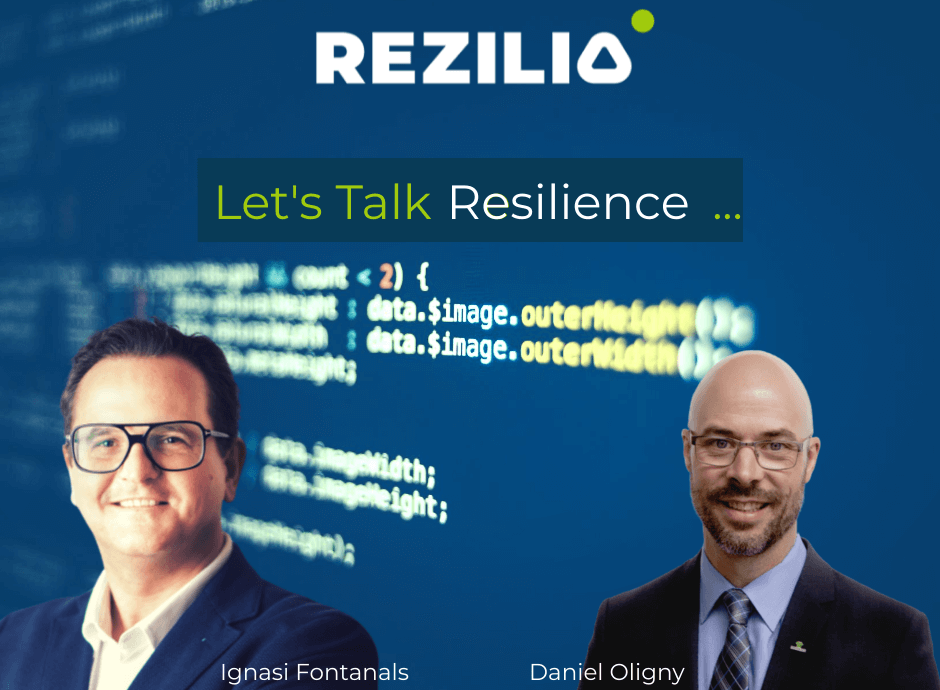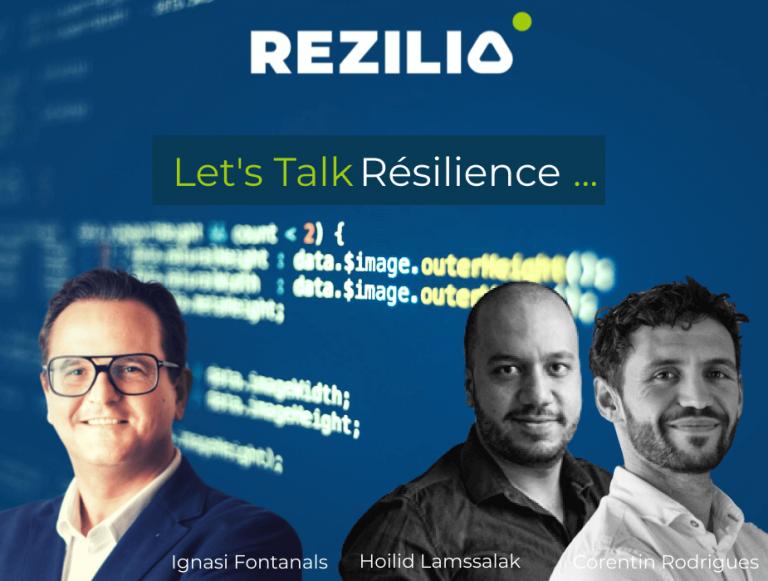“All it takes is for an organization to face a disaster to realize its vulnerability to plans that are not updated.”
Interview with Daniel Oligny of Prudent
(A freedom of adaptation has been taken to make the text coherent but no words have been changed)
“All it takes is for an organization to face a disaster to realize its vulnerability to plans that are not updated.”
Ignasi: Hello and welcome to Let’s Talk Resilience, you know that Let’s Talk Resilience is a section of our blog at Rezilio Technology where we talk with experts and professionals from the world of resilience around the world in Quebec, Canada and Europe. So today we have with us Daniel Oligny who is the Director of Business Development at Prudent and we are going to introduce him to you, but it must be said that Prudent is the father or mother of Rezilio Technology.
Rezilio is a company that develops a suite of tools so that organizations and territories can be more resilient to any event and always be calm in the face of any disruption, so Rezilio was born from Prudent and Daniel Oligny participated in its evolution, because for 28 years he has been working in the field of prevention and risk management and he is passionate about organizational resilience, so in this conversation today I would like you to start by explaining how you started working in the areas of crisis management and resilience.
Daniel : Thank you for the privilege of speaking with you. Well, for this occasion I am a firefighter by training and it must be said that 28 years ago I decided to become a firefighter and as I progressed in my career I saw that people were often poorly organized to deal with the disasters to which they were exposed, whether they were natural disasters, explosions, collapses or accidents, whatever.At that time I was a firefighter, so I was fighting fires, and then in my training I specialized in fire prevention.
In 2003 I started my career at Prudent and that’s when I really saw that my skills as a firefighter and fire preventionist could give the customer the opportunity to really see things.
Ignasi: Tell us a little bit more about the company and the vision for the future. How Prudent Consulting Group’s services are adapting and not only to resilience but also to climate change and its consequences.
Daniel :.Our primary mandate is to accompany all of our clients in their efforts to achieve organizational resilience. Prudent is located in Canada in the Montreal region and our activities are in Canada as well as in the province of Quebec where we have four major markets. So the municipal market, where we have the privilege of accompanying several municipalities that represent 1.5 million people in our customer base out of a population of 8.5 million. We are happy to count already 1.5 million citizens who are in the municipalities accompanied by Prudent and Rezilio.
“We have the privilege of accompanying several municipalities that represent 1.5 million people in our client base out of a population of 8.5 million.
We also have a second field of activity, which is the industrial environment, The third area of expertise is at the school level. We also have the other component: health, which represents hospitals, long-term care facilities, local service centers, and we have been working to develop specific strategies and plans for these organizations.
As I said, we have expertise in industrial risks, crisis management, continuity of operations, fire safety, and risk management, safety management, so we have a wide range of expertise in all these areas. Today Prudent has about twenty full-time employees.
Ignasi: We see in different countries like Canada, Quebec, how national and regional strategies adapt over time to new situations.
How have these markets adapted in your experience with Prudent, and how will approaches to crisis and risk management evolve in the coming years? Do you think it is necessary to improve when you see the Canadian reality on this aspect?
Daniel: I will give you the example of Quebec City. We have in the 2 major centers which are Montreal and Quebec, a concentration at the industrial level, at the social level, the immigration, the universities, the poles of research and development… so essentially everything happens in Montreal and Quebec.
Outside of the major centers, we have smaller municipalities, between 100,000 and 300,000 citizens, and outside of these cities, we have rural Quebec where not many people simply live. But the fact that a large proportion of Quebec’s territory is very little occupied, it results from it that one exploits it much on the level of the natural resources, and the province of Quebec is the granary of a good part of the east of Canada, on the level of the agriculture, on the level of the wheat, or on the level of the dairy products etc. And also we have all the years of industrial transformation of the raw materials that we go to get in the region.
The risks we face are largely attributable to human activity in rural areas. However, infrastructures to face disasters in rural areas are less developed, necessarily and we see that there are huge disparities in terms of management and capacity to intervene.
unfortunately, we had to face disasters that made political decision-makers aware of the realities we were facing. In 2002, we had the first law on civil security in Quebec, but it is only in 2019 that the regulation came into force that obliges local authorities, cities, villages, municipalities, to have a civil security plan, and that determines the minimum to be met to be able to face an exceptional situation.
“In 2002, for the first time in Quebec, we had the law on civil security, which encompasses the global management of intervention levels in order to be able to face any disaster.
The notion of resilience has been talked about in Quebec since 2014. It was the first guide that was published by the Minister of Public Security, in which he referred to resilience. . More and more today in Quebec, with the law on civil security, with the regulations that bind the city, we have the notion of resilience that makes you think differently, so when you “think outside the box”.
There is a large city in the Montreal area, the City of Laval, which decided in January 2021 to create the municipal office of resilience. The objective is to have a transversal vision of the organization to avoid working in silos.
In Quebec, the notion of resilience, the transversal vision, the notion of interoperability, the work in convergence, we are starting to work on it.
Ignasi: So you are talking about this vision of resilience that is starting to develop, so from the point of view of technology, how do you think it will help? What are the challenges that organizations, territories, are going to have to face in its crisis and resilience components in connection with the preparation and all this strategic work? Tell us a little bit about your vision of technology.
Daniel: What we see now are organizations that want to have a global view of the organization of their territory, but they have difficulty seeing the interrelationships of interdependencies and the consequences of a breakdown in one place in the system. Therefore, with the tools of Rezilio Technology, we will now be able to locate all the risks in a given territory, and we will be able to identify the vulnerabilities in order to better identify the interdependencies between the systems because in Quebec and everywhere else in the world, we work in silos
Ignasi: Yes, and besides, there are these tools that are coming, these tools of interdependence, but also I think that the Quebec market is quite advanced in everything that is the digitization of plans, in other markets, in France or in Europe, How did this transition happen in Quebec?
Daniel: It only takes an organization facing a disaster to realize its vulnerability to plans that are not updated in paper format. But also to have the ability to get the information.
I will give a very concrete example. At the beginning of the summer, the city of Candiac experienced a major natural gas leak. Such a major crisis meant that in addition to cutting off the gas supply to the entire region, we had to cut off the electricity and also cut off the telephone lines, etc. To avoid all the effects the managers wanted to manage the plan and apply the procedures. If they had not had the digital solution with the Rezilio application they would not have had access to their plan because there was no wifi network, cellular data, so here is a concrete example that Rezilio is the solution. The managers had direct access from Rezilio to the information of the plans in the field and they were able to manage at the municipal coordination center the same. IThey were able to manage the situation.
More and more people want to have access to their plans at all times. They want to have access to their procedures and the digitization of the old plans, which are in paper format. In the two hundred or so municipal organizations that work with us now, they have access at all times. And they can share digital information with each other based on the access rights they have on the different platforms.
Ignasi: It’s very interesting the case of Quebec and how they deal with these subjects. It is a case of governance of “resilience” and often at Prudent you say “we are resilient because we are interoperable”. . For example, there are police departments that can access a school at the click of a button and the school plans. That’s where you start to build a resilience index.
So finally, I just wanted to ask if you could tell us about an event or emergency situation where your organization or community came through, learned, and became stronger for the future and therefore more resilient.
Daniel: I can give you another example, which is not necessarily a disaster but digitalization has allowed organizations, this organization in height, It is the G7 summit that Canada hosted in the region of La Malbaie,
We had the privilege of accompanying them to prepare for the arrival of the G7 dignitaries and we worked openly with the federal government, with the federal police, with the army, with the government services that were deploying security in the summit area with international partners.
We made this municipal organization realize that they need to be accompanied so that they see the bigger picture and not just the impact on the end citizen. We got them to identify plan a and plan b and plan c so that’s resilience too. It is facing adversity regardless of the type and level in terms of probability of occurrence or impact on the community.
We managed to get through the three days of the summit. We had planned how the municipality was going to manage, for example, if there were demonstrations if there was breakage, how do we manage that? As a municipality and also how do we make our citizens safe? So we worked and we brought the organization to work with a council and not just one against the federal government and to bring together the provincial government, the mayor etc.
Ignasi: thank you very much Daniel. It was very interesting what you taught us. I think that with the new technologies, this blog post will be read all over the world because I think that it is very interesting to be able to exchange from one side of the Atlantic to the other on its experiences. of course, there are things that you have already done in Quebec or in Canada, but it is another vision of what you have experienced and it is this collaboration that will help us.
Thank you for talking to us today, if anyone wants to contact Prudentjust reach you on your website. www.prudent.ca
Thank you very much and good continuation
???? Rezilio is distributed in Canada by Prudent https://prudent.ca/
???? For more information about REZILIO you can request a full demonstration https://www.rezilio.com






